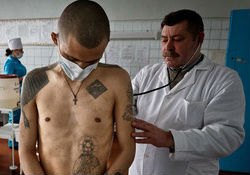World Tuberculosis Day 2014: boost efforts to eliminate TB by 2050

WHO/Maxim Dondyuk
24 March 2014
Greater action is required to eliminate tuberculosis (TB) globally, and address the emergence and spread of resistant forms of the disease. European countries have done much since adopting of the Consolidated Action Plan to Prevent and Combat Multidrug- and Extensively Drug-Resistant Tuberculosis (M/XDR-TB) in the WHO European Region 2011–2015, including scaling up diagnosis and treatment. But this is not enough. WHO/Europe urges Member States to boost their efforts to reach the target of eliminating TB globally by 2050.
Reaching this target requires that all patients be diagnosed early and fully treated, not only half of them diagnosed and then half-treated. New anti-TB medicines are needed, with shorter and more effective treatment regimens, putting patients at the centre of care.
Challenge of drug-resistant TB in the WHO European Region
Drug-resistant TB is of particular concern to the European Region, where 15 of the 27 countries worldwide with a high burden of MDR-TB are found. Despite improved diagnostics and treatment, cases are confirmed in less than half of the estimated people in the Region with MDR-TB, due to limited laboratory capacity, and treatment is reported to be successful in only half of confirmed cases.
New report launched
World TB Day is held each year on 24 March, marking the day in 1882 when Dr Robert Koch announced his discovery of the bacterium that causes TB.
WHO/Europe and the European Centre for Disease Prevention and Control (ECDC) will release a new report on World TB Day 2014, providing a picture of the TB and MDR-TB burden in the European Region. It will be launched at a high-level event in Copenhagen, Denmark on 24 March, attended by Zsuzsanna Jakab, WHO Regional Director for Europe, and Marc Sprenger, Director of ECDC. Representatives of key stakeholder and diplomatic missions in Denmark will discuss progress, challenges and next steps for TB control. A photo book with patients’ stories will also be released to emphasize the importance of putting patients at the centre of care.



